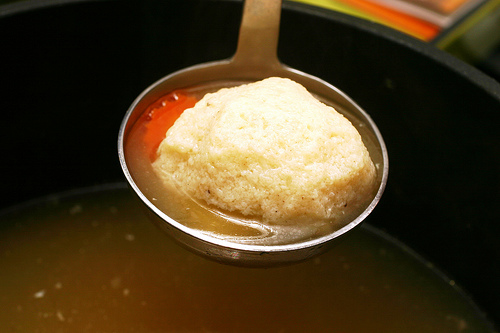 So much fuss over a matzah ball, nu?
So much fuss over a matzah ball, nu?
Well, not a matzah ball, but a knaidel. Or is it kneydl? Or knaydl? Or kneidel? Because when Arvind Mahankali, a 13-year-old from Queens, correctly spelled the word for a doughy dumpling that even the most unengaged of Jews have consumed, he unleashed an unabahsed frenzy of Semitic semantics.
Arvind won the Scripps National Spelling Bee based on his performance. He had placed third the previous two years, stumbling on German-based words before, according to reports. This time he vanquished his “German curse” on the Yiddish-based word for bubbe’s (bubby’s?) specialty (which, by the way, has the alternative spellings of matza ball or matzoh ball, if we’re talking synonyms).
The whole reason for the letter-specificity confusion is that, of course, knaidel is not spelled that way at all. It is not spelled with an “ai” or an “ei” or “ey.” It is not spelled with letters from our alphabet, period. Yiddish, German in origin, Jewish in use, employs letters from the aleph-bet — Hebrew letters grafted onto that tongue by a people who carried their learning into exile. In shorthand, Yiddish, along with other languages such as Karaim, Judæo-Arabic and Ladino, sums up the idea that we have frequently been strangers in a strange land, adapting, bending and influencing the cultures in which we find ourselves. You’ve all seen the novelty baseball caps that read, “רעד סאקס” before.
Knaidel is, in fact, spelled קניידל. That’s the real spelling
In English there is no true spelling for the word, although Scripps defaults on this, and all its spellings, to Webster’s Third International Dictionary. And there clearly is a wide variety of transliterations acceptable for the word; enough that the New York Times ran a front page article after Arvind’s triumph delineating the different spellings you could possibly have for a knaidel, with the esteemed repository for all things Yiddish, YIVO, weighing in. And this without getting into whether you like the fluffy, floaty type of matzah ball in your soup, or the dense golf ball variety that sink to the bottom of your bowl. Never mind whether you want them pristine white, or dotted with nutmeg and parsley!
 There have been an abundance of news articles, feature stories in or on just about every news platform imaginable. And not just from the Jewish press, although there has been much ruminating from that quarter — with this piece being yet another — so much so that Heeb, the online hipster publication queried if the French go wild every time they see the word “baguette” in print?
There have been an abundance of news articles, feature stories in or on just about every news platform imaginable. And not just from the Jewish press, although there has been much ruminating from that quarter — with this piece being yet another — so much so that Heeb, the online hipster publication queried if the French go wild every time they see the word “baguette” in print?
You have to wonder, why? When was the last time you remember knowing anything about the national spelling bee, much less what the winning word was?
There are two reasons in my mind that make knaidel resonate, one distinctly Jewish and the other more generally American. The Jewish one poses one of those “we have arrived” moments, when something that was distinctly ours, a knaidel, bursts upon the national stage as something broad and general. Knaidel is an encapsulated version of watching “Seinfeld” during its first run and realizing that while only Jerry was allowed to be a Jewish character, all the characters were, indeed, very Jewish. George not Jewish? Yeah, right. And there they were, arguing about marble rye and babkas (or is that bobkas) on prime time television in the 1990s.
Of course, Jews arrived long ago in mainstream American culture, with words like “kvetch” and “shlep” taking their place in the popular lexicon. Bagels have long been a go-to breakfast bread, even in places far from the East Coast. We should probably get over ourselves on this one.
Arvind’s victory resonates for us even more deeply, however, in the way that it telegraphs a uniquely American experience. His family is from Hyderabad in Southern India. He faced off against another Asian child, Pranav Sivakumar. They represent a new generation of strivers, experiencing a type of success that coming to America has always meant for those looking for a better or new way of life. Arvind is us, about one century after the great Jewish migration to this country. He, like all those Jewish immigrants before, has arrived.
And where else could this ultimate act of acculturation happen? Just where could the son of immigrant Indians appear on national television, spelling out to geeky victory, the Yiddish name for a Jewish soul food?
Only in America.

As usual Marla, witty, informative and thoughtful piece.
Great commentary on The Bee and the boy!
so what is the correct spelling for Chanukah according to the spelling bee mavens?
According Webster’s Dictionary, the correct spelling is Hanukkah, which is also the preferred spelling in the Associated Press Stylebook, to which most non-Jewish news media default. The YIVO Institute for Jewish Research prefers “Khanike,” a spelling that no doubt, would look decidedly bizarre to most. I prefer Chanukah, and in my past role at Jewish newspapers, used that spelling. In short, take your pick.
Delightful article, Marla. Thank you.
Very interesting acticle. We are Elise Israel’s parents.